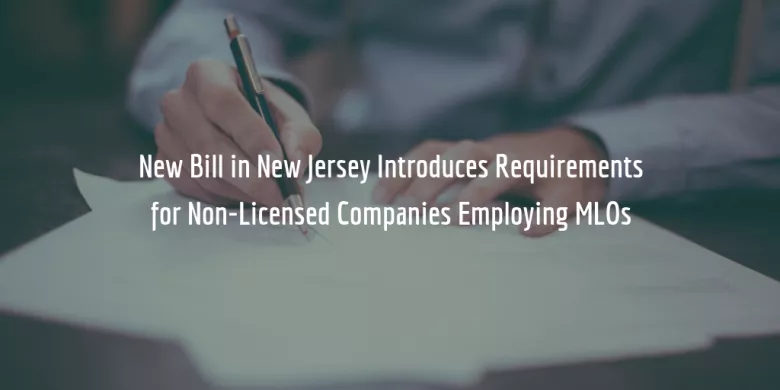New Jersey Companies Employing Mortgage Loan Originators Must Get Bonded

A recently adopted bill in New Jersey has revised the New Jersey Residential Mortgage Lending Act (RMLA) and introduced several new provisions. The new law introduces requirements for entities that are exempt from licensing yet employ mortgage loan originators (MLOs).
As of November 24, 2018, such entities will need to register in the state and post a blanket surety bond in an amount of at least $25,000.
Keep reading for an overview of the new law and its provisions!
New Registration Requirements in Assembly Bill 2035
What is an exempt company?
AB2035 amends a number of sections of the New Jersey Residential Mortgage Lending Act. Among other things, the bill introduces the definition of "exempt company". Such a company:
- Is different from a bona fide not for profit entity
- Is not subject to licensing as a residential mortgage lender or broker
- Is required to be registered, as defined by the bill
- Is a company that employs or will employ one or more licensed mortgage loan originators
Registration requirements
After introducing the definition of "exempt company", the bill also amends Section 4 of the RMLA to specify the registration requirements for such companies. To qualify as an exempt company, an entity must be engaged in performing mortgage loan origination "solely by virtue of its performance of loan processing or underwriting functions."
If a company qualifies, then it is required to register with the Commissioner of Banking and Insurance as well as the Nationwide Mortgage Licensing System and Registry (NMLS). During the registration process, such a company will need to:
- Complete and submit an application to the Commissioner
- Obtain a $25,000 blanket surety bond
- Pay a nonrefundable application fee to the Commissioner (not to exceed $500, and determined by the Commissioner) as well as a pay any required fees to the NMLS
Responsibilities of registered companies
An exempt company registered under Section 4 of the RMLA must comply with several obligations and responsibilities. Such companies must:
- Respond in a timely manner to the Commissioner when the latter requests access to their books, records, accounts, documents, and any other information that relates to their operations
- Submit a mortgage call report of conditions to the NMLS as and when required to do so
- Notify the Commissioner within 10 days of the occurrence of any event that causes the company to no longer qualify for a registration as an exempt entity
- Employ at least one licensed mortgage loan originator to act as a supervisor to loan processors or loan underwriters employed at the company, but not as an originator
Surety Bond Requirement for Exempt Companies
How much does it cost to get bonded?
The cost of your bond is determined by the surety when you apply. It is equal to a percentage of the total amount of the bond. The main factor that influences your bond cost is your personal credit score - applicants with a high score pay low premiums, whereas applicants with lower scores pay higher premiums.
You can get an estimate of your bond cost by utilizing our surety bond calculator below.
Surety bond cost calculator
Why is a bond required?
The bill states that the $25,000 bond required of exempt companies is put in place to guarantee for their mortgage loan origination related services. Under the surety bond agreement, anyone who suffers losses or damages as a result of the wrongful actions by such a company can secure compensation. Such wrongful actions include fraud, misrepresentation, default, and others.
In other words, the surety bond is put in place to protect clients of such exempt companies. Under the bond agreement, when a claim is filed against the bond, the company has to take care of the claim. If the company is unable to do so, the surety will cover the claim, up to the full amount of the bond. Ultimately, though, the company remains liable and must repay the surety in full for its coverage.
Do you have any additional questions about this type of bond? Call us at 877.514.5146 anytime to speak to one of our bond professionals!
- Fast and Secure Application
- Nationwide Coverage
- Approval in Minutes
- Money Back Guarantee
Recommended Articles
- Fast and Secure Application
- Nationwide Coverage
- Approval in Minutes
- Money Back Guarantee
- Image

- Image

- Image

Lance Surety Bond Associates, Inc. is a surety bond agency based out of southeastern Pennsylvania that is able to write all surety bond types in all 50 states. We are dedicated to servicing all of our customers' surety bonding needs throughout the country and guarantee competitive rates, timely responses, and unparalleled customer service.







